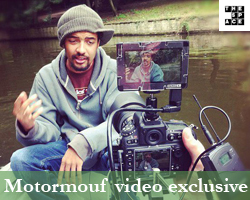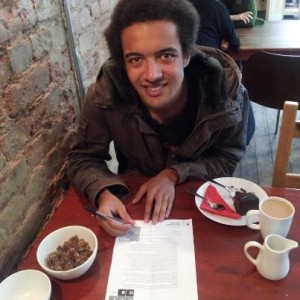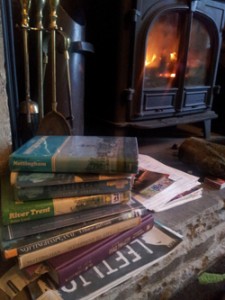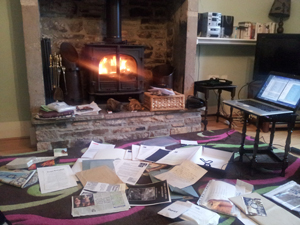 Event 4 the ‘turgid Trent’ is now live on The Space and features four essays by myself and two spoken word videos from Andrew ‘MulletProofPoet’ Graves and Alex ‘MotaMouf’ Young. I want to dedicate this blog to MotaMouf.
Event 4 the ‘turgid Trent’ is now live on The Space and features four essays by myself and two spoken word videos from Andrew ‘MulletProofPoet’ Graves and Alex ‘MotaMouf’ Young. I want to dedicate this blog to MotaMouf.
I first saw beatboxer MotaMouf performing at the Riverside Festival with Maniere des Bohemiens, a gypsy swing-jazz band from Nottingham. Then a few months later with Nina Smith on the LeftLion stage at Spendour. I was blown away by this teenager with the elastic mouth who was able to adapt his style to any kind of rhythm. I asked him if he would be interested in performing on stage with me at a spoken word event called Gunpowder, Treason and Pot. The conceit was simple: I’d ask him a question and he would make all of these weird noises. Then when I gave up trying to communicate with him and motioned to walk off stage he would burst out with an amazing poem about Rosa Parks (which is published in Issue 49 of LeftLion, out today.) It worked brilliantly and was the latest example of his incredibly versatile talent.
MotaMouf’s inclusion on The Space was not planned and was completely inspired by Kate Tempest’s outstanding performance video for Tongue Fu. I realised we had to diversify our text heavy content and that it would also be great to see him given a voice on such a prestigious stage. As always he was excited and prepared to try anything. A fitting lesson to other performers out there…

MotaMouf signs contract on the bribe of cake and tea in Lee Rosy’s. Photo and food costs James Walker.
The theme for Event Four is ‘Solitude: Is it possible in a digital age?’ I met up with MotaMouf a few times at Broadway and we worked on various ideas. I asked him to think about the electronic noise of modern life such as vehicles telling you that they’re reversing, elevator musIz, Tesco self-service tills, and city buses asking you to join their Facebook group every five minutes. He then went away and worked on a narrative.
During these meetings MotaMouf confessed that he felt kind of typecast as a beatboxer and was currently the front man of a new band called Just James. He was also more in to rap and grime music now. I told him to combine all of these things and to go with what felt right as I had every confidence he’d produce something fantastic. At the time I was writing accompanying essays about how Alan Sillitoe hated being labelled as a ‘working class writer’ and an ‘angry young man’ and so it seemed a bit hypocritical to limit MotaMouf in a similar manner. The whole purpose of the Sillitoe Trail is to broaden the reach of literature and make Sillitoe’s novel accessible to audiences who may otherwise never have encountered it. Rap and grime are such audiences. Tick.
The video was shot by NG64bars and is absolutely beautiful. My only instruction was that it had to be near a canal to link to the essays. A really important element of The Space is building up partnerships with other organisations and trying to support and promote each other. Robert Freeman Cooper has done a brilliant job and I’m delighted to be able to bring his organisation in as a partner and promote yet another great organisation in Nottingham as well as an incredibly talented beatboxer. I mean rapper. I mean poet. You know what I mean.
Please note: MotaMouf used to be spelled MotorMouf. He has very recently changed the spelling of this as it is not quite as unique a name as you might imagine.


